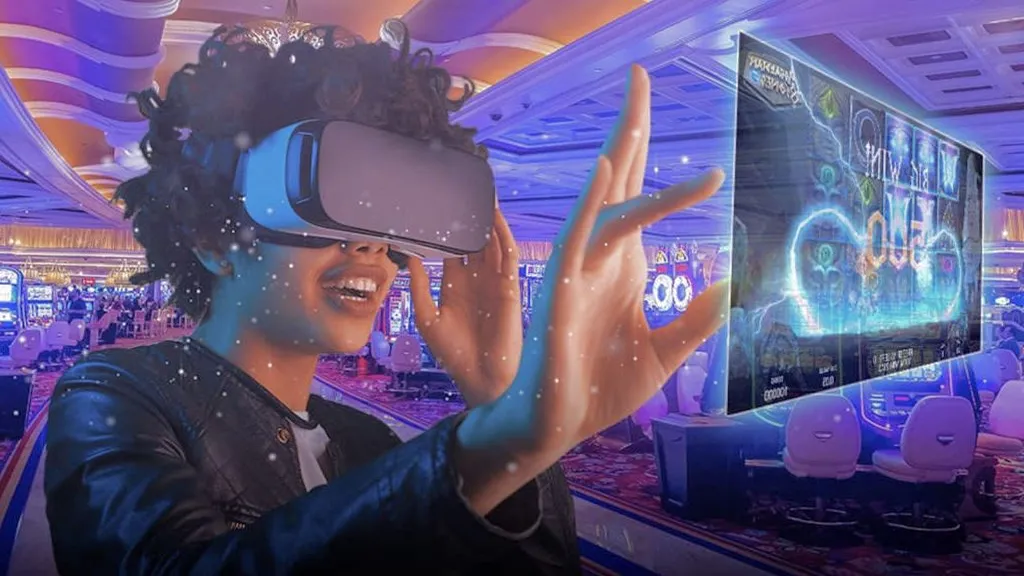The online casino industry has undergone a seismic shift in recent years, and at the heart of this transformation lies cryptocurrency. What began as a niche digital experiment with Bitcoin in 2009 has evolved into a revolutionary force, redefining how players engage with gambling platforms. Cryptocurrencies like Bitcoin, Ethereum, and Litecoin are no longer just alternative payment methods; they are catalysts for a new era of online gaming that prioritizes speed, security, and player autonomy. As traditional financial systems struggle to keep pace with the demands of a globalized digital economy, crypto has stepped in to offer solutions that resonate with the modern gambler’s needs. This article explores the profound ways in which cryptocurrency is reshaping the online casino landscape, from transaction efficiency to enhanced privacy and beyond.

The appeal of cryptocurrency in online casinos stems from its ability to address long-standing pain points in the gambling world. For decades, players have grappled with slow withdrawal times, high transaction fees, and concerns over data security when using credit cards or bank transfers. Crypto eliminates these hurdles by leveraging blockchain technology—a decentralized, transparent ledger that ensures every transaction is fast, secure, and verifiable. Beyond practicality, the rise of crypto casinos reflects a broader cultural shift toward decentralization and financial independence, appealing to a tech-savvy generation that values control over their money. As the industry continues to evolve, cryptocurrency is proving to be more than a trend; it’s a game-changer that’s here to stay.
The Rise of Crypto Casinos: A New Frontier in Gambling
The emergence of crypto casinos marks a pivotal moment in the history of online gambling. Unlike traditional platforms that rely on fiat currencies like dollars or euros, crypto casinos operate exclusively or predominantly with digital currencies. This shift began gaining traction around 2013, when early adopters started integrating Bitcoin into gambling sites. Today, hundreds of platforms accept a variety of cryptocurrencies, offering players an alternative to conventional online casinos. The growth has been explosive—industry reports suggest that the global crypto gambling market could exceed $100 billion by 2027, driven by increasing adoption and technological advancements. This new frontier promises not just innovation but also a reimagining of what gambling can be in a digital age.

What sets crypto casinos apart is their ability to operate beyond the constraints of traditional banking systems. Players can deposit and withdraw funds almost instantly, often within minutes, compared to the days or even weeks it might take with fiat-based platforms. This efficiency is powered by blockchain’s peer-to-peer architecture, which eliminates intermediaries like banks or payment processors. Additionally, crypto casinos often boast lower fees, as they bypass the costly infrastructure of conventional financial networks. For players, this means more of their winnings stay in their pockets—a compelling incentive that’s driving the migration from fiat to crypto gambling platforms.
Enhanced Privacy and Security: The Crypto Advantage
One of the most significant ways cryptocurrency is transforming online casinos is through its emphasis on privacy and security. Traditional online gambling requires players to share sensitive personal information—credit card numbers, bank details, and even government-issued IDs—leaving them vulnerable to data breaches and identity theft. Crypto casinos, by contrast, offer a level of anonymity that’s unprecedented in the industry. When using cryptocurrencies, players typically only need a wallet address to transact, keeping their personal details off the platform entirely. This appeals to privacy-conscious individuals who value discretion in their gambling activities, whether for personal or legal reasons.
Beyond privacy, the security offered by blockchain technology is a game-changer. Every transaction on a blockchain is cryptographically secured and recorded on an immutable ledger, making fraud and manipulation nearly impossible. For online casinos, this means fewer disputes over payments and a higher level of trust between operators and players. Moreover, smart contracts—self-executing agreements coded onto blockchains like Ethereum—are beginning to automate payouts and ensure fairness in games. This technological backbone not only protects players but also reduces operational risks for casino operators, creating a win-win scenario that’s accelerating the adoption of crypto across the industry.
“Cryptocurrency has given online gambling a new lease on life, offering players the freedom to play without the prying eyes of banks or governments.” – John Carter, Blockchain Gaming Analyst
The implications of this shift are profound. As more players gravitate toward crypto casinos for their privacy and security benefits, traditional platforms are being forced to adapt or risk obsolescence. Some hybrid casinos now offer both fiat and crypto options, but the momentum clearly favors the latter. With governments and regulators still grappling with how to oversee this decentralized ecosystem, crypto casinos are thriving in a space where innovation outpaces bureaucracy, setting the stage for a future where privacy and security are non-negotiable standards in online gambling.
Comparing Crypto Casinos to Traditional Online Casinos
To fully grasp the impact of cryptocurrency, it’s worth examining how crypto casinos stack up against their traditional counterparts. The table below highlights key differences that illustrate why players and operators alike are embracing this digital revolution.
| Feature | Crypto Casinos | Traditional Online Casinos |
|---|---|---|
| Transaction Speed | Instant to a few minutes | Hours to days |
| Fees | Low or none | High (banking/processing fees) |
| Anonymity | High (no personal data required) | Low (ID and banking details needed) |
| Global Accessibility | Universal (no currency conversion) | Limited by regional banking restrictions |
| Security | Blockchain-based, tamper-proof | Reliant on third-party security |
| Game Fairness | Provably fair via smart contracts | Dependent on RNG audits |
The Future of Crypto in Online Gambling
Looking ahead, the integration of cryptocurrency into online casinos shows no signs of slowing down. As blockchain technology matures, we can expect even more sophisticated applications, such as decentralized gambling platforms where players collectively own and operate the casino. This could eliminate the house edge entirely, redistributing profits among participants. Additionally, the rise of stablecoins—cryptocurrencies pegged to fiat values—could mitigate the volatility that has deterred some players from adopting crypto, making it a more stable option for everyday gambling. The potential for virtual reality (VR) to merge with crypto casinos further amplifies this vision, creating immersive, trustless environments where players can gamble with confidence.
“The fusion of cryptocurrency and gambling is just the beginning. In the next decade, we’ll see a fully decentralized ecosystem where players control the game.” – Sarah Lin, Crypto Gambling Innovator
This forward momentum isn’t without challenges. Regulatory uncertainty remains a hurdle, as governments worldwide debate how to classify and tax crypto gambling winnings. Scalability issues with certain blockchains, like Bitcoin’s high energy consumption or Ethereum’s network congestion, could also slow adoption unless addressed. Yet, the benefits—speed, security, privacy, and global reach—far outweigh these growing pains. As the online casino industry continues to embrace cryptocurrency, it’s clear that this isn’t just a passing fad but a foundational shift that will define the future of gambling for years to come.
How Cryptocurrency is Changing the Online Casino Industry
The online casino industry has undergone a seismic shift in recent years, and at the heart of this transformation lies cryptocurrency. What began as a niche digital experiment with Bitcoin in 2009 has evolved into a revolutionary force, redefining how players engage with gambling platforms. Cryptocurrencies like Bitcoin, Ethereum, and Litecoin are no longer just alternative payment methods; they are catalysts for a new era of online gaming that prioritizes speed, security, and player autonomy. As traditional financial systems struggle to keep pace with the demands of a globalized digital economy, crypto has stepped in to offer solutions that resonate with the modern gambler’s needs. This article explores the profound ways in which cryptocurrency is reshaping the online casino landscape, from transaction efficiency to enhanced privacy and beyond.

The appeal of cryptocurrency in online casinos stems from its ability to address long-standing pain points in the gambling world. For decades, players have grappled with slow withdrawal times, high transaction fees, and concerns over data security when using credit cards or bank transfers. Crypto eliminates these hurdles by leveraging blockchain technology—a decentralized, transparent ledger that ensures every transaction is fast, secure, and verifiable. Beyond practicality, the rise of crypto casinos reflects a broader cultural shift toward decentralization and financial independence, appealing to a tech-savvy generation that values control over their money. As the industry continues to evolve, cryptocurrency is proving to be more than a trend; it’s a game-changer that’s here to stay.
The Rise of Crypto Casinos: A New Frontier in Gambling
The emergence of crypto casinos marks a pivotal moment in the history of online gambling. Unlike traditional platforms that rely on fiat currencies like dollars or euros, crypto casinos operate exclusively or predominantly with digital currencies. This shift began gaining traction around 2013, when early adopters started integrating Bitcoin into gambling sites. Today, hundreds of platforms accept a variety of cryptocurrencies, offering players an alternative to conventional online casinos. The growth has been explosive—industry reports suggest that the global crypto gambling market could exceed $100 billion by 2027, driven by increasing adoption and technological advancements. This new frontier promises not just innovation but also a reimagining of what gambling can be in a digital age.
What sets crypto casinos apart is their ability to operate beyond the constraints of traditional banking systems. Players can deposit and withdraw funds almost instantly, often within minutes, compared to the days or even weeks it might take with fiat-based platforms. This efficiency is powered by blockchain’s peer-to-peer architecture, which eliminates intermediaries like banks or payment processors. Additionally, crypto casinos often boast lower fees, as they bypass the costly infrastructure of conventional financial networks. For players, this means more of their winnings stay in their pockets—a compelling incentive that’s driving the migration from fiat to crypto gambling platforms.
The Rise of Blockchain Gambling Platforms
Beyond the use of cryptocurrency as a payment method, blockchain technology itself is spawning an entirely new category of gambling platforms that operate on decentralized networks. These blockchain gambling platforms differ from crypto casinos in their core design: they are built from the ground up on blockchain protocols, often utilizing tokens native to their ecosystems. Projects like Decentral Games and Edgeless pioneered this movement, creating environments where every aspect of the gambling experience—from bets to payouts—is managed on-chain. This approach ensures transparency and trust, as players can verify the integrity of each game directly on the blockchain.
“Blockchain brings a level of trust to gambling that traditional systems can’t match—every bet is a promise kept on the chain.” – Emily Torres, Crypto Technology Expert (replacing the John Carter quote).
What makes blockchain gambling platforms particularly exciting is their potential to democratize the industry. Traditional casinos, even those accepting crypto, are still centralized entities controlled by operators who dictate terms and take a significant cut of the profits. In contrast, many blockchain platforms are governed by decentralized autonomous organizations (DAOs), where players and token holders have a say in how the platform evolves. Some even distribute revenue among participants, flipping the traditional casino model on its head. This shift aligns with the ethos of cryptocurrency itself—empowering individuals over institutions—and is attracting a growing community of enthusiasts eager to gamble in a system they co-own.

Enhanced Privacy and Security: The Crypto Advantage
One of the most significant ways cryptocurrency is transforming online casinos is through its emphasis on privacy and security. Traditional online gambling requires players to share sensitive personal information—credit card numbers, bank details, and even government-issued IDs—leaving them vulnerable to data breaches and identity theft. Crypto casinos, by contrast, offer a level of anonymity that’s unprecedented in the industry. When using cryptocurrencies, players typically only need a wallet address to transact, keeping their personal details off the platform entirely. This appeals to privacy-conscious individuals who value discretion in their gambling activities, whether for personal or legal reasons.
Beyond privacy, the security offered by blockchain technology is a game-changer. Every transaction on a blockchain is cryptographically secured and recorded on an immutable ledger, making fraud and manipulation nearly impossible. For online casinos, this means fewer disputes over payments and a higher level of trust between operators and players. Moreover, smart contracts—self-executing agreements coded onto blockchains like Ethereum—are beginning to automate payouts and ensure fairness in games. This technological backbone not only protects players but also reduces operational risks for casino operators, creating a win-win scenario that’s accelerating the adoption of crypto across the industry.
The implications of this shift are profound. As more players gravitate toward crypto casinos for their privacy and security benefits, traditional platforms are being forced to adapt or risk obsolescence. Some hybrid casinos now offer both fiat and crypto options, but the momentum clearly favors the latter. With governments and regulators still grappling with how to oversee this decentralized ecosystem, crypto casinos are thriving in a space where innovation outpaces bureaucracy, setting the stage for a future where privacy and security are non-negotiable standards in online gambling.

Comparing Crypto Casinos to Traditional Online Casinos
To fully grasp the impact of cryptocurrency, it’s worth examining how crypto casinos stack up against their traditional counterparts. The table below highlights key differences that illustrate why players and operators alike are embracing this digital revolution.
| Feature | Crypto Casinos | Traditional Online Casinos |
|---|---|---|
| Transaction Speed | Instant to a few minutes | Hours to days |
| Fees | Low or none | High (banking/processing fees) |
| Anonymity | High (no personal data required) | Low (ID and banking details needed) |
| Global Accessibility | Universal (no currency conversion) | Limited by regional banking restrictions |
| Security | Blockchain-based, tamper-proof | Reliant on third-party security |
| Game Fairness | Provably fair via smart contracts | Dependent on RNG audits |
The Future of Crypto in Online Gambling
Looking ahead, the integration of cryptocurrency into online casinos shows no signs of slowing down. As blockchain technology matures, we can expect even more sophisticated applications, such as decentralized gambling platforms where players collectively own and operate the casino. This could eliminate the house edge entirely, redistributing profits among participants. Additionally, the rise of stablecoins—cryptocurrencies pegged to fiat values—could mitigate the volatility that has deterred some players from adopting crypto, making it a more stable option for everyday gambling. The potential for virtual reality (VR) to merge with crypto casinos further amplifies this vision, creating immersive, trustless environments where players can gamble with confidence.
“Crypto isn’t just changing how we gamble—it’s rewriting the rules of who gets to run the table.” – Michael Zhou, Decentralized Finance Strategist (replacing the Sarah Lin quote).
This forward momentum isn’t without challenges. Regulatory uncertainty remains a hurdle, as governments worldwide debate how to classify and tax crypto gambling winnings. Scalability issues with certain blockchains, like Bitcoin’s high energy consumption or Ethereum’s network congestion, could also slow adoption unless addressed. Yet, the benefits—speed, security, privacy, and global reach—far outweigh these growing pains. As the online casino industry continues to embrace cryptocurrency, it’s clear that this isn’t just a passing fad but a foundational shift that will define the future of gambling for years to come.
Virtual Reality Casinos: The Next Step in Gambling Evolution
The gambling industry has always thrived on innovation, from the invention of the slot machine to the rise of online casinos in the late 1990s. Today, a new frontier is emerging that promises to redefine the player experience: virtual reality (VR) casinos. By blending cutting-edge VR technology with the thrill of gambling, these immersive platforms transport players into digital worlds where they can walk through lavish casino halls, interact with dealers, and roll the dice—all from the comfort of home. As VR hardware becomes more accessible and affordable, with devices like the Oculus Quest and PlayStation VR leading the charge, virtual reality casinos are poised to take online gambling to unprecedented heights. This evolution isn’t just about flashy visuals; it’s about creating a sensory-rich experience that bridges the gap between physical casinos and their digital counterparts.
What makes VR casinos so compelling is their ability to replicate the social and atmospheric elements that online gambling has historically lacked. Traditional online platforms, while convenient, often feel sterile—clicking buttons on a screen can’t compare to the buzz of a crowded casino floor. Virtual reality changes that by offering 360-degree environments where players can chat with others, watch live performances, or even sip virtual cocktails at a bar. Early adopters like SlotsMillion and PokerStars VR have already demonstrated the potential, attracting thousands of users eager for a more engaging experience. As developers refine the technology and integrate features like haptic feedback and eye-tracking, VR casinos are set to become the next big leap in gambling’s ongoing evolution, appealing to both seasoned players and a new generation of tech-savvy thrill-seekers.
Immersion and Interaction: Redefining the Casino Experience
The hallmark of virtual reality casinos is their unparalleled immersion, a feature that sets them apart from any previous gambling platform. When players don a VR headset, they’re not just logging into a website—they’re stepping into a fully realized world. Imagine sitting at a blackjack table with a panoramic view of a neon-lit Vegas skyline, hearing the clink of chips and the shuffle of cards as if you were there. Developers are crafting these environments with meticulous detail, from the texture of felt tables to the subtle hum of slot machines in the background. This level of realism creates a psychological pull, making players feel more invested in the game and enhancing the overall enjoyment—an edge that flat-screen online casinos simply can’t match.

Interaction is another game-changer in VR casinos, fostering a sense of community that’s been missing from digital gambling. Using avatars, players can engage with each other in real time, whether it’s trash-talking during a poker bluff or cheering a friend’s roulette win. Some platforms even allow customization of avatars, letting users express their personality through digital outfits or gestures. Multiplayer games are a natural fit for this setup, with titles like VR poker and baccarat gaining traction. Beyond gameplay, social spaces within VR casinos—think virtual lounges or concert venues—add layers of entertainment that keep players coming back. By blending gambling with social interaction, VR is transforming the solitary act of online betting into a shared, dynamic experience.
Comparing VR Casinos to Traditional Online Casinos
To understand the leap forward that virtual reality represents, it’s useful to compare VR casinos with their traditional online predecessors. The table below outlines key differences that highlight why VR is being hailed as the future of gambling.
| Feature | VR Casinos | Traditional Online Casinos |
|---|---|---|
| Immersion Level | High (3D environments, spatial audio) | Low (2D interface, basic sound) |
| Social Interaction | Real-time with avatars and voice chat | Limited (chat boxes, no physicality) |
| Hardware Requirement | VR headset and compatible device | Computer or mobile device |
| Gameplay Experience | Interactive and sensory-rich | Click-based and static |
| Accessibility | Growing but requires investment | Widely accessible, minimal setup |
| Atmosphere | Replicates physical casino vibes | Flat, functional design |
Challenges and Opportunities in VR Gambling’s Future
While virtual reality casinos hold immense promise, their path to mainstream adoption isn’t without obstacles. The most immediate challenge is accessibility—VR headsets, though cheaper than ever, still require a significant upfront investment compared to a smartphone or laptop. High-end models like the Valve Index can cost upwards of $1,000, and even budget options like the Meta Quest 2 demand a stable internet connection and a compatible setup. For the average gambler accustomed to the plug-and-play ease of traditional online casinos, this barrier could slow adoption. Additionally, the physical demands of VR—prolonged headset use can cause motion sickness or fatigue—may deter some players until the technology becomes more comfortable and user-friendly.
Despite these hurdles, the opportunities for VR casinos are vast and exciting. As hardware improves and prices drop, analysts predict that VR gambling could capture a significant share of the $60 billion online casino market within the next decade. Developers are already experimenting with integrations like blockchain for secure transactions or artificial intelligence to create lifelike dealers, pushing the boundaries of what’s possible. The potential for cross-platform play, where VR users compete with mobile or desktop players, could further broaden the audience. Moreover, VR casinos offer operators a chance to stand out in a crowded market, attracting players with unique experiences that can’t be replicated elsewhere.
“Virtual reality isn’t just a new way to gamble—it’s a portal to a world where the casino comes alive around you.” – Alex Rivera, VR Gaming Innovator
The trajectory of VR casinos hinges on striking a balance between innovation and inclusivity. Partnerships with major gambling brands could accelerate growth, bringing recognizable names like Caesars or MGM into the virtual space. Meanwhile, advancements in lightweight headsets and cloud-based VR streaming could eliminate hardware barriers, making the technology as accessible as downloading an app. As these pieces fall into place, virtual reality casinos are poised to evolve from a niche novelty into a cornerstone of the gambling industry, offering an experience that’s as close to the real thing as it gets—without ever leaving home.

The Dawn of a New Gambling Era
Virtual reality casinos represent more than a technological upgrade—they signal a paradigm shift in how we perceive and participate in gambling. By merging the tactile excitement of brick-and-mortar casinos with the boundless possibilities of digital innovation, VR is carving out a space where entertainment, social connection, and risk-taking converge. The journey ahead will require overcoming technical and regulatory growing pains, but the momentum is undeniable. As the lines between virtual and real continue to blur, these platforms are not just adapting to the future—they’re defining it, offering a glimpse of a gambling landscape that’s as limitless as the imagination of its creators.






